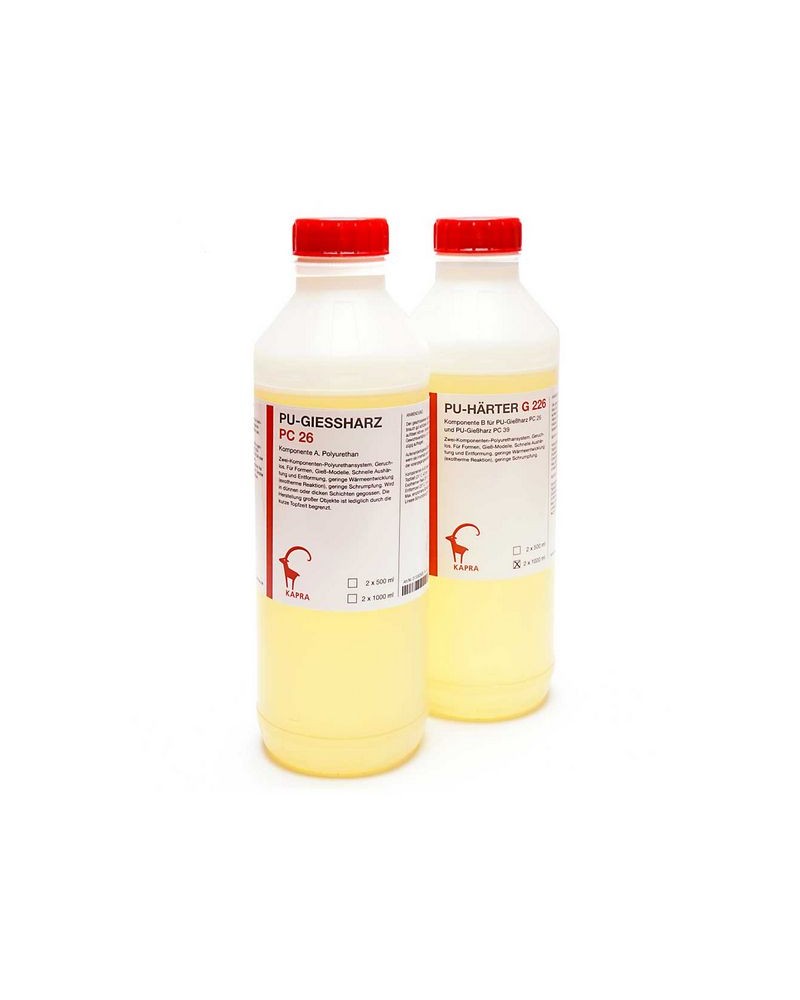
PU resin PC 26 + PU curing agent G 226
All prices incl. VAT, plus shipping costs.
For deliveries to countries other than Germany
the final prices may change in the checkout.
MORE INFO
We deliver fast - Postage free from 150 € (DE) - 60 days right of return - mail@bildhau.de - Tel.: +49 (0)221-99874700





All prices incl. VAT, plus shipping costs.
For deliveries to countries other than Germany
the final prices may change in the checkout.
MORE INFO
Sehr flüssiges Gießharz (geringe Viskosität), sehr kurze Topfzeit und Entformzeit für schnelle Abgüsse.
Zwei-Komponenten-Polyurethansystem. PU-Gießharz PC26 (Komponente A) + PU-Härter G226 (Komponente B).
Geruchlos. Für den Oberflächenguss und Massivguss. Zum Einbetten von Gegenständen. Schnelle Aushärtung und Entformung, geringe Wärmeentwicklung (exotherme Reaktion), geringe Schrumpfung, insbesondere bei Zugabe von Füllstoffen. Wird in dünnen oder dicken Schichten gegossen. Die Herstellung großer Objekte ist lediglich durch die kurze Topfzeit begrenzt. Gut einfärbbar, gut mischbar mit Bronze- und anderen Metallpulvern. Kann mit Füllstoffen verarbeitet werden.
Anwendung:
Den geschlossenen Harzbehälter (Komponente A) vor Gebrauch gut schütteln, damit sich etwaige Ablagerungen auflösen können. Komponente A und Komponente B im Gewichtsverhältnis 100:100 sorgfältig vermischen und zügig auftragen. Darauf achten, dass alle Gegenstände, die mit dem Polyurethanharz in Berührung kommen, absolut trocken sind, da sonst die Aushärtung gestört werden oder es zu einer unerwünschten Schaumbildung kommen kann.
Massive Objekte können in Schichten gegossen werden. Aufeinanderfolgende Schichten binden sich chemisch, wenn sie innerhalb von 10 Minuten nach dem Festwerden der vorangegangenen Schicht aufgebracht werden.
Kann mit Füllstoffen angedickt werden. Die Schrumpfung wird verringert durch die umfangreichere Verwendung von Füllstoffen. Sofern Füllstoffe (Komponente C) benutzt werden, Komponente A, Komponente B und Komponente C z.B. im Gewichtsverhältnis 100:100:300 abwiegen. Die größere Menge des Füllstoffs zunächst mit Komponente B (PU-Härter) vermischen, die kleinere Menge mit Komponente A (PU-Gießharz). Anschließend beide Massen sorgfältig vermengen und zügig verarbeiten.
TECHNISCHE ANGABEN
Polyurethanharz PC26 (A)
Farbe: weiß
Dichte bei 25 °C: 0,98-1,00 g/cm³
Polyurethanhärter G226 (B)
Farbe: gelb
Dichte bei 25 °C: 1,10-1,12 g/cm³
| Komponenten | A + B | A + B + C |
| Gewichtsverhältnis | 100:100 | 100:100:300 |
| Topfzeit (25 °C, 40 mm, 100 ml) | 3-4 Minuten | 5-7 Minuten |
| Exothermischer Peak (25 °C, 40 mm, 100 ml) | 82 °-92 °C | 50 °-60 °C |
| Aushärtung (25 °C, 100 ml) | 6-8 Minuten | |
| Entformzeit (25 °C, 15 ml, 6 mm) | 1-1,5 Stunden | 1-1,5 Stunden |
| Max. empfohlene Schichtstärke | 5 mm | 30-70 mm |
| Lineare Schrumpfung (25 °C, 5 mm, 24 Stunden) | 0,57-0,65 ‰ | 0,37-0,43 ‰ |
| Lineare Schrumpfung (25 °C, 5 mm, 1 Monat) | 4,2 ‰ |
Ab dem 24. August 2023 muss vor der industriellen oder gewerblichen Verwendung eine angemessene Schulung erfolgen.
Polyurethan-Gießharz PC26 KOMPONENTE A:
Das Produkt ist nach GHS/CLP-Richtlinien kennzeichnungspflichtig. Kennzeichnung gemäß Verordnung (EG) 1272/2008:
GHS07, GHS09
Signalwort: ACHTUNG
Enthält: Ethylendiamin propoxylier
Bis(isopropyl)naphthalin
Kohlenwasserstoff, C12-C15, n-Alkane, Isoalkane, Cyclen, 2% Aromaten
Glycerin, propoxyliert
Titanium Dioxide
H319 Verursacht schwere Augenreizung. H410 Sehr giftig für Wasserorganismen mit langfristiger Wirkung.
P264 Nach Handhabung die Haut gründlich waschen. P273 Freisetzung in die Umwelt vermeiden. P280 Schutzhandschuhe / Schutzkleidung / Augenschutz / Gesichtsschutz tragen. P337 + P313 Bei anhaltender Augenreizung: Ärztlichen Rat einholen / ärztliche Hilfe hinzuziehen. P391 Verschüttete Mengen aufnehmen. P501 Inhalt / Behälter einer zugelassenen Abfallentsorgungsanlage zuführen.
Polyurethan-Härter G226 KOMPONENTE B:
Das Produkt ist nach GHS/CLP-Richtlinien kennzeichnungspflichtig. Kennzeichnung gemäß Verordnung (EG) 1272/2008:
GHS07, GHS08, GHS09
Signalwort: GEFAHR
Enthält: Diphenylmethandiisocyanat
4,4 i-Methylendiphenyldiisocyanat
Mit Tripropylenglykol modifiziertes MDI
Bis(isopropyl)naphthalin
o-(p-Isocyanatobenzyl)phenylisocyanat
H304 Kann bei Verschlucken und Eindringen in die Atemwege tödlich sein. H315 Verursacht Hautreizungen. H317 Kann allergischeHautreaktionen verursachen. H319 Verursacht schwere Augenreizung. H332 Gesundheitsschädlich bei Einatmen. H334 Kann bei Einatmen Allergie, asthmaartige Symptomeoder Atembeschwerden verursachen. H335 Kann die Atemwege reizen. H351 Kann vermutlich Krebs erzeugen (bei Einatmen). H373 Kann die Organe (Atemwege) schädigen bei längerer oder wiederholter Exposition. H411 Giftig für Wasserorganismen mit langfristiger Wirkung.
P260 Staub / Rauch / Gas / Nebel / Dampf / Aerosol nicht einatmen. P273 Freisetzung in die Umwelt vermeiden. P280 Schutzhandschuhe / Schutzkleidung / Augenschutz / Gesichtsschutz tragen. P301 + P310 Bei Verschlucken: Sofort Giftinformationszentrum oder Arzt anrufen. P304 + P340 Bei Einatmen: An die frische Luft bringen und in einer Positionruhigstellen, die das Atmen erleichtert. P312 Bei Unwohlsein Giftinformationszentrum oder Arzt anrufen. P308 + P313 Bei Exposition oder falls betroffen: Ärztlichen Rat Einholen / ärztliche Hilfe hinzuziehen. P331 Kein Erbrechen herbeiführen. P391 Verschüttete Mengen aufnehmen.
EUH 204 Enthält Isocyanate. Kann allergische Reaktionen hervorrufen.